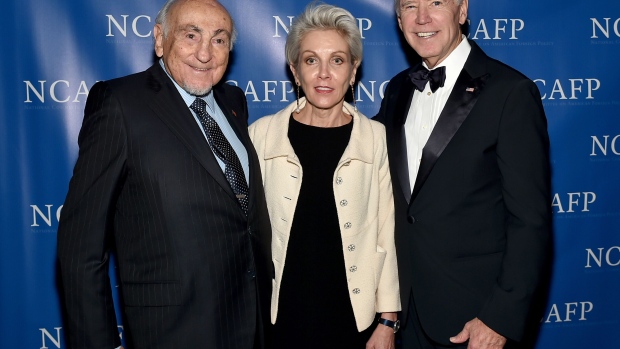Mar 13, 2024
Bernard L. Schwartz, Loral CEO Who Funded Democrats, Dies at 98
, Bloomberg News

(Bloomberg) -- Bernard L. Schwartz, the longtime head of Loral Corp. who became one of the US Democratic Party’s top financial backers during Bill Clinton’s presidency, has died. He was 98.
He died on Tuesday at his home in Manhattan, according to his wife, Denise.
As chairman and chief executive officer, Schwartz built New York-based Loral into a major military electronics contractor that posted 96 consecutive quarters of increasing profits beginning in 1972. In 1996, it sold the bulk of its business to Lockheed Martin Corp. for about $9 billion.
A Brooklyn-born accountant, Schwartz engineered more than 16 major acquisitions that helped turn Loral into a global enterprise. From 1986 to 1996 alone, Loral spent more than $4 billion to acquire assets from companies including Unisys, International Business Machines, LTV, Ford Motor, Fairchild Weston, Honeywell and Goodyear, the New York Times reported.
Schwartz for a time was among the highest-paid American CEOs. Businessweek reported that he took in $5.8 million in salary in 1991, more than any of his peers.
His political donations, among the largest to the Democratic Party during eight years of Clinton’s presidency, triggered accusations of cronyism. According to a report in the Times, White House Deputy Chief of Staff Harold Ickes wrote to Clinton in a 1994 memorandum on fundraising, “I have it on very good authority that Mr. Schwartz is prepared to do anything he can for the Administration.”
The Times also reported that Loral needed and received swift permission from the Clinton White House to launch a satellite aboard a Chinese rocket in 1998. Schwartz told the Times there was “no linkage” between his donations and the decision Loral had sought. “I consider him a friend, but not the kind of friend that you can call upon for favors,” he said of Clinton.
In 2002, Loral agreed to pay a civil fine of $14 million to settle government charges that the company had violated rules by selling satellite and missile technology to China in 1996.
‘Almost Obscene’
Even as he made lists of America’s biggest political donors, Schwartz expressed misgivings about the amount of money in politics.
“I agree with most critics who say there’s too much money in the system,” he said in a 2007 interview. “It’s not so much money being supplied. I would like to see some curtailment the way it’s spent, some kind of cap. It’s getting to be almost obscene.”
The pattern repeated itself in 2016. Schwartz donated $1 million to a super-PAC supporting Hillary Clinton’s second bid for the Democratic presidential nomination, making him one of her top backers. Soon after, he said political action committees should face stricter limits on what they can collect from big-dollar donors.
Giving to PACs “distorts the political process,” he said. “Rich people have the opportunity to get access.”
Schwartz continued giving to Democrats, including to a super-PAC supporting Joe Biden’s successful presidential bid in 2020.
Bernard Leon Schwartz was born on Dec. 13, 1925, in Brooklyn, New York, to Harry Schwartz and the former Hannah Foreman.
His paternal grandfather was a mid-level functionary for New York City’s Democratic Party machine, known as Tammany Hall. Following his death, the group sent his widow “a turkey and a bag of coal” each Thanksgiving and Christmas, Schwartz recalled. “These were modest contributions to her financial requirement, but the family knew somebody there cared for them, and it made good Democrats of all of the following five generations.”
He served in the Army Air Corps before graduating from City College of New York with a Bachelor of Science degree in finance.
Opposed Vietnam War
Schwartz was a partner at the accounting firm Schnee Hover & Schwartz from 1948 until 1962 before becoming CEO at Leasco Corp., a New York-based computer-leasing company, in 1969.
When Schwartz — an opponent of the war in Vietnam — bought a controlling stake in Loral in 1972, it was a small, near-bankrupt military contractor based in the Bronx that made copper wire, industrial meters and toys in addition to defense electronics systems. He wasted little time junking the non-defense businesses and focusing the company on radar systems.
Following the 1996 sale to Lockheed Martin, Schwartz created Loral Space & Communications Inc. with hopes of building a satellite system that would let people use a mobile telephone anywhere in the world. That company filed for Chapter 11 bankruptcy protection in 2003, two years after the bankruptcy filing of another satellite company he led, Globalstar LP.
Schwartz stepped down in March 2006, just a few months after the bankruptcy exit, and started a New York-based investment firm, BLS Investments LLC.
As a philanthropist, Schwartz established biomedical-imaging and radiology centers at New York University, where he also set up a urological-research foundation. His other beneficiaries included the New York Historical Society, the Asia Society, Baruch College and Fordham University.
Through a foundation named after him and his first wife, Irene, he supported the New School for Social Research, the Carnegie Endowment for International Peace, the Roosevelt Institute and the Paul H. Nitze School of Advanced International Studies at Johns Hopkins University. Schwartz was also a member of the Council on Foreign Relations, where he established a senior fellowship in business and foreign policy.
With Irene, who died in 2014, Schwartz had two daughters.
©2024 Bloomberg L.P.


